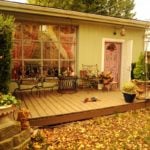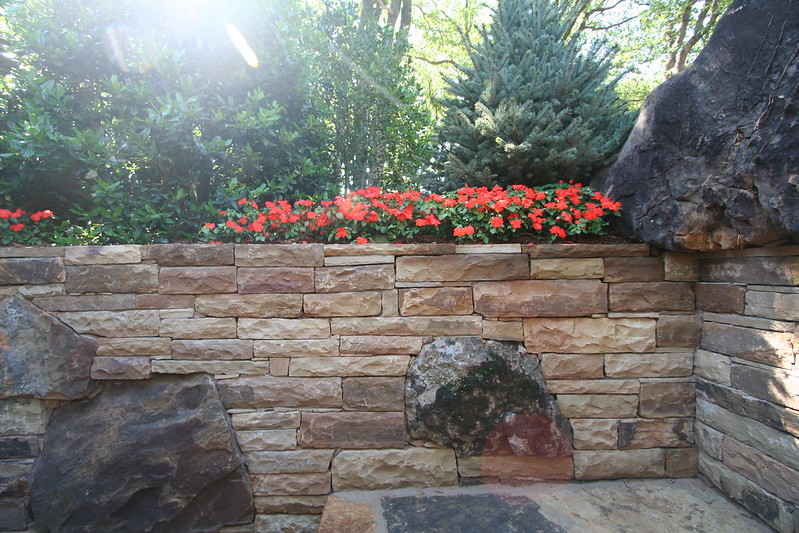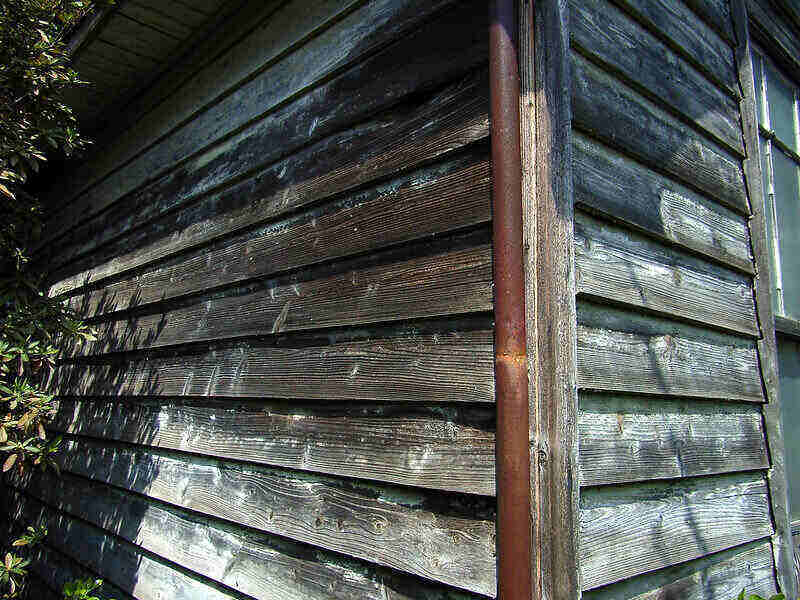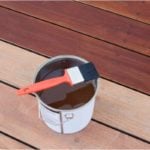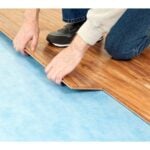The cost of a fully installed composite deck averages from $25 – $50 per square foot. Prices can be as low as $20 per square foot or as high as $55 per square foot. The average job costs about $8,860, with most jobs costing $5,100 – $11,200.
Have you seen a lot of press about composite decking but wondered if this exceptional material came with an exceptional price tag? This cost guide will discuss the pricing you can expect when planning for a composite deck.
In this cost guide:
- Average Costs
- Cost Estimator by Size
- Other Factors That Affect Cost
- Related Services
- Pro Cost vs. DIY Cost
- Cost by Location
- FAQ
Average Composite Decking Costs in 2025
| National Average Cost | $8,860 |
| Typical Price Range | $5,100 – $11,200 |
| Extreme Low-End Cost | $3,600 |
| Extreme High-End Cost | $20,000 |
What is composite decking? Composite decking is usually a blend of recycled wood and plastic materials that provides a low-maintenance, long-lasting decking solution for residential and commercial clients.
In contrast with wood decking, composite materials resist insects and rot, don’t splinter, and come with stain and fade protection to maintain their natural wood appearance for many years
In addition, most composite decking materials come with manufacturer warranties of 25 – 50 years and don’t need an annual stain and seal. For these reasons, composite decking has gained significant traction in the decking market since its inception in the mid-’90s.
Composite Decking Cost Estimator By Size
As with standard deck costs, size and materials may be your two most important variables, aside from labor. Composite decking typically costs $25 – $50 per square foot. If these prices seem outside your range, keep in mind that choosing a basic deck design, reducing your deck size, and choosing different product lines can lower your upfront costs.
| Deck Size | Typical Cost |
| 12 x 12 | $3,600 – $7,200 |
| 16 x 16 | $6,400 – $12,800 |
| 20 x 20 | $10,000 – $20,000 |
Other Factors That Affect Cost
Aside from size, the cost of composite decking is also impacted by the following factors:
Brand
Here is a sampling of decking material costs per square foot by the manufacturer. Note: These are costs for the deck materials only. Railings and costs for the fascia and substructure components (posts, joists, beams, etc.) are not included in these figures.
| Brand | Typical Cost / Sq. Ft. |
| FiberOn | $4.48 – $13.18 |
| TimberTech | $7.15 – $13.40 |
| Trex | $5 -$11 |
Materials
Aside from composite decking material, you will need additional materials to build a composite deck, including:
- Composite deck boards
- Railing
- Posts
- Hardware
Brand and quality also affect the cost of additional materials.
Maintenance Costs
Here is another perk: Composite decking boards require very little upkeep. If you are tired of the annual wash, stain, and seal, that alone may be enough to make you a composite convert. To maintain a composite deck:
- Sweep the deck as needed
- Hose off spills as they happen
- Use a mild soap or store-bought composite cleaner once or twice a year
- Depending on the particular brand of material, you may be able to use a pressure washer as needed.
Shape and Angles
A standard rectangular deck is the cheapest option. From there, more sides and more complexity lead to higher costs. Intricate deck designs require more labor (and skill) than simple shapes. Your contractor will have to cut and measure every angle.
Prep Work
Before the crew can start on your deck, they may need to prepare the work site. Prep work may include:
- Deck removal: If you are replacing an existing deck, expect to pay $5 – $15 per square foot for deck removal.
- Grading and leveling: You want to build your deck on a flat-level service. Expect to pay $0.40 – $2.00 per square foot for leveling and at least $500 for grading.
- Substructure construction: If you do not have an existing base for your deck, one will have to be constructed. Expect to pay about $4 per square foot.
- Land clearing: If there are trees and other vegetation that needs to be cleared, you will have to add the cost to clear land. Expect to pay about $1.18 to $2 per square foot.
Add-ons
Here are a few of those little extras that may add to the overall project cost:
- Furniture: Once your new composite deck is in place, everyone will want to visit, so plan on buying some new furniture for your friends and family to enjoy.
A basic table and two chairs will run about $100, and it goes up from there. Sectionals, couches, and lounge chair sets will easily cost several hundred to several thousand dollars.
- Lighting: If you plan to do outdoor entertaining on your deck or are concerned about safety, lighting is probably necessary. Ask your landscaping contractor about a lighting package. This will run an extra $1,500 – $3,000 on average.
- Roofing and awnings: For some decks, especially attached structures, a roof is a nice, or in some climates, a necessary addition. Costs range from $2,500 to about $10,000.
If awnings are more your style, the average awning installation will cost around $2,500, while prices can range from $1,300 to $4,000.
Related Services
Home improvement projects are usually multi-faceted, and deck builders are often part of larger landscaping firms that offer many types of outdoor services. Here are a few extra projects you may consider to enhance your outdoor space:
Landscaping
If you’ve got a beautiful new deck, you need a landscape to match, or at least a pretty area to border the deck. Many homeowners install softscaping areas around the deck complete with mulch, flowers, bushes, and perennials, depending on the size of your deck. Expect landscaping costs to run between $5 – $24 per square foot for this service.
| National Average Cost | $12,825 |
| Typical Price Range | $4,000 – $20,317 |
| Extreme Low-End Cost | $2,000 |
| Extreme High-End Cost | $38,333 |
Fire Pit
Fire pits add warmth, light, and ambiance to any outdoor living space and most fire pits cost $240 – $2,400. Prefabricated above-ground fire pits are the cheapest and custom-built in-ground fire pits cost the most.
| National Average Cost | $850 |
| Typical Price Range | $240 – $2,400 |
| Extreme Low-End Cost | $200 |
| Extreme High-End Cost | $5,0000 |
Hot tub
Many homeowners put a hot tub on their deck and most hot tubs cost $4,500 – $10,000. Inflatable hot tubs are the cheapest, but they also have the shortest lifespan. Acrylic hot tubs can be pricey, but they are energy efficient and durable.
| National Average Cost | $6,900 |
| Typical Price Range | $4,500 – $10,000 |
| Extreme Low-End Cost | $1,000 |
| Extreme High-End Cost | $25,500 |
Paver Driveway
Paver driveways are durable, attractive, and do wonders for your curb appeal. The typical cost of a paver driveway is around $5,500 – $26,000.
| National Average Cost | $13,000 |
| Typical Price Range | $5,500 – $26,000 |
| Extreme Low-End Cost | $2,000 |
| Extreme High-End Cost | $64,800 |
Note: If you are in the market for a new driveway and pavers are out of your budget, the typical cost of a concrete driveway is much less and they are also pretty durable.
Sprinkler System
Sprinkler systems are an efficient and convenient way to care for your yard’s catering needs. Most sprinkler systems cost $2,400 – $4,200. Prices vary depending on the size and makeup of your lawn and the sprinkler system type.
| National Average Cost | $3,150 |
| Typical Price Range | $2,400 – $4,200 |
| Extreme Low-End Cost | $825 |
| Extreme High-End Cost | $8,300 |
Pergola Installation
Pergolas are semi-shaded outdoor structures that are affordable and can even be built DIY. Typically, a professionally installed pergola costs about $4,000.
| National Average Cost | $4,000 |
| Typical Price Range | $2,100 – $6,000 |
| Extreme Low-End Cost | $1,050 |
| Extreme High-End Cost | $11,000 |
Cost of a DIY Composite Deck
The easiest way to get an estimate on what your composite deck will cost is to go to one of the major manufacturer’s websites and plug the following into their cost calculator:
- Your ZIP code
- Square footage
- Do you need railings?
- Do you need a substructure?
As part of the process, you also choose the product line you’re interested in, which will give you a close estimate on what you can expect your costs to be.
Cost Breakdown
This is a general list of tools that you may need to complete your project. Check the manufacturer’s installation guide for a more accurate list of tools needed for that product.
| Equipment | Typical Cost |
| Tape measure | $18 |
| Steel tamper/digging bar | $30 – $80 |
| Speed square | $7+ |
| Sawhorses | $40+ |
| Protective equipment | $60 |
| Mixing paddle | $14+ |
| Level | $35 |
| Hammer | $18 |
| Clamps | $40 |
Please see typical heavy equipment rental prices in the table below.
| Equipment | Daily Rental Rate |
| Air compressor | $32 – $55 |
| Circular saw | $24 |
| Miter saw | $49 |
| Post hole digger | $10 |
| Pneumatic nail gun | $29 |
| Table saw | $49 |
Typical DIY material cost:
- Base level materials costs = $14.34/square foot
- Mid-range materials costs = $19.13/square foot
- Top-level materials costs = $22.40/square foot
How to Install a DIY Composite Deck in 10 Steps
Installing a composite decking system, according to one manufacturer’s website, is similar to installing a wood deck. However, there are a few manufacturer specifications that you will need to follow.
Just make sure you read each manufacturer’s installation guide. Most manufacturers have a YouTube channel as well, to make the process easier.
This is a rough outline of how you may go about installing a new composite deck:
Step 1: Be sure to check with your local building department to get code requirements. Also, check with your HOA, if applicable.
Step 2: Create your blueprint.
Step 3: Check with your insurance company and tax assessor’s office to inquire about how a new deck may influence your homeowner’s policy or tax responsibility.
Step 4: Apply for a building permit and inquire about the inspection process.
Step 5: Call 811 to have your utilities department mark utility lines before you dig.
Step 6: Grab a friend (or two).
Step 7: Do any needed site preparation.
Step 8: Install your deck.
Step 9: Pass the building inspection.
Step 10: Enjoy the fruits of your labor.
DIY Cost vs. Professional Service
Materials are about the same as labor costs, so if you have all the equipment, expect a DIY composite deck to cost about half of professional decking prices. However, if you don’t already have the tools and heavy equipment, you can catch up quickly to the price of professional installation.
Cost of a Composite Deck By Location
Just as with wood decking materials, composite decking material costs can vary by location:
- Taxes: Any new home addition can affect your property taxes. Contact your tax assessor’s office while you are in the planning stages of the project for more information.
- Insurance: You’ll want to ask your insurance company if your new addition will be covered under your homeowners’ policy and if this capital improvement will increase the cost of your policy.
- Permits: Unless you are building a very small or ground-level deck, you’ll probably need a building permit. Application fees are usually required. (Check with your local building permit office even if you’re building a small or low deck just to be safe.)
- Installation costs: Areas with a higher cost of living typically have higher installation costs. Supply and demand can also affect installation costs. For example, if a hurricane recently hit your area, contractors are very busy and likely to charge more for elective services.
FAQ About Composite Decking
Yes. Just as you would do when cutting wood, you need to wear a mask, safety glasses, and probably gloves as well. Also, composite shavings cannot be left on the ground to biodegrade due to their plastic content.
Most composite materials do have a very natural look to them, but you may find that as the cost increases, the appearance improves as well.
Yes. Synthetic decking can be curved. Check with your landscape architect or contractor to make sure this detail is considered in the early stages of the design process. There is more than one way to do this depending on the design and equipment available.
If you are concerned about the weather in your area, composite decking may be a good choice. If you live in a cold climate with heavy snow or if you live near saltwater, composite decking is often preferred over pressure-treated wood or other real wood due to its ability to resist harsh wear and tear from the elements.
Another note on durability: Look for capped vs. uncapped composite decking. Most boards today come capped, but double-check. Capped boards have an outer coating that is bonded to the board’s core, giving it extra protection against the elements.
Composite decking wins in the “best perks” category. Looking for a warranty on your investment? Composite decking comes with manufacturer and fade/stain warranties of 25, 30, or even 50 years depending on the product line.
Certain product lines even come with a limited labor warranty if your contractor meets certain requirements.
Note: Most composite manufacturers specify the type of nozzle and PSI, though, as failing to follow these specifications may damage your decking and void your warranty.
Final Thoughts
If you are interested in a low-maintenance, durable deck system, composite materials are worth your consideration. A composite deck may require more upfront costs, but with their warranties and minimal maintenance, they are worth the investment.
In addition, composite decks are a great way to allow you to enjoy the outdoors. Contact a local composite decking pro today to get a quote!
Michelle Selzer contributed to this article.
Main Photo by: Fiberon / Flickr / CC BY-ND 2.0
